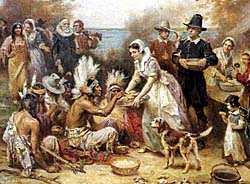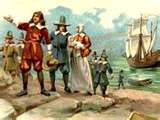
By. Jim Crooks
Have you ever heard the one about the Pilgrims landing on Plymouth Rock because they ran out of beer? Well, they actually didn’t land on Plymouth Rock (a story for another day), but they did anchor in Plymouth Bay because the beer was getting low. Here’s the skinny with the help of Cecil Adams from straightdope.com and beerinstitute.org:

It’s true, the Mayflower colonists decided to settle at Plymouth because they were running low on beer. In an age when so many have lost their moral compass, it's comforting to know that people in the old days had their priorities straight.
Pretty much everything you think you know about the Pilgrims is wrong (including their being called Pilgrims--that term didn't catch on until centuries later), so it's not surprising the beer angle slipped under the radar.
On November 9, 1620 [November 19 by modern reckoning], after 64 days at sea, the Mayflower sighted Cape Cod. You may inquire: What sort of idiot would sail across the North Atlantic at the height of storm season? The voyagers probably asked themselves the same question. They'd initially left Southampton, England, in August, but one of their two ships, the Speedwell, sprang a leak. Repair attempts failed, and by the time the travelers had consolidated themselves on the Mayflower, a month had passed. Then they spent an extra couple weeks under sail due to bad weather, arriving just in time for winter.
Beer was a dietary mainstay in those days. Chances are the beverage in question was "ship's beer," a not-very-alcoholic concoction that, along with the even weaker "small beer," was drunk in formidable quantities during the colonial era (upwards of a quart per day seems to have been a typical ration). Undoubtedly an advantage was that, unlike more perishable foodstuffs, ship's beer would keep during long voyages and, having been boiled, was likely purer than ordinary water.
The colonists used up their beer by Christmas. At first the ship's captain gave them a little out of the crew's supply, but when sickness, possibly scurvy, began felling the travelers (about half died that first winter), things got ugly. "As this calamity fell among the passengers that were to be left here to plant, and were hasted ashore and made to drink water that the seamen might have the more beer, and one in his sickness desiring but a small can of beer, it was answered that if he were their own father he should have none" (Bradford, History of Plymouth Plantation, circa 1650). The captain relented when his own men began getting sick too, evidently not wanting it to be known to history that, in addition to being late, lost, etc, he was the SOB who hogged the beer.
That may have been the last time America's settlers ran short of beer. They soon learned from their Indian neighbors how to make beer from maize. Local breweries sprouted up throughout the colonies, and experienced brewmasters were eagerly recruited from London. By 1770 the American brewing industry was so well established that George Washington, Patrick Henry, and other patriots argued for a boycott of English beer imports. The Boston Tea Party almost became the Boston Beer Party.

